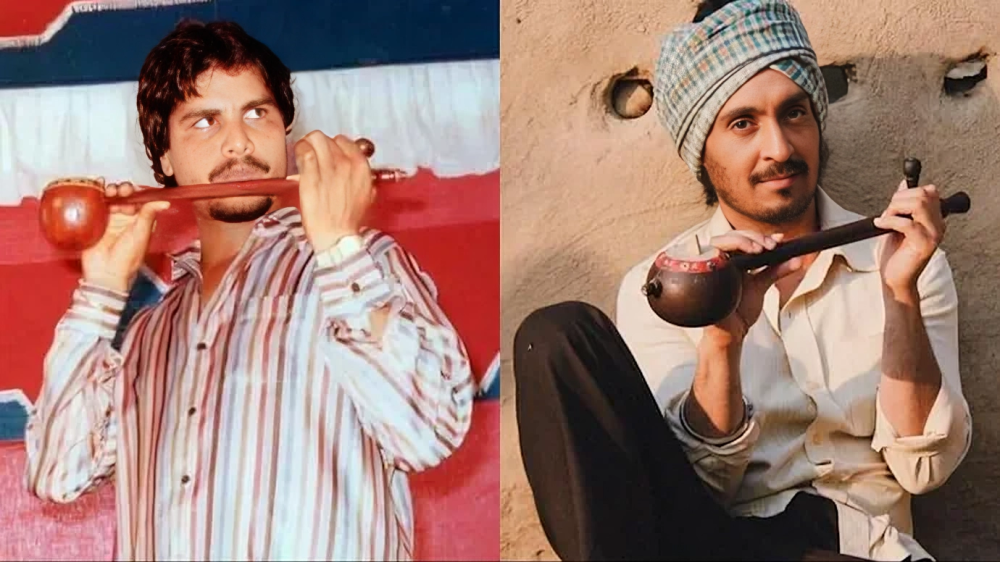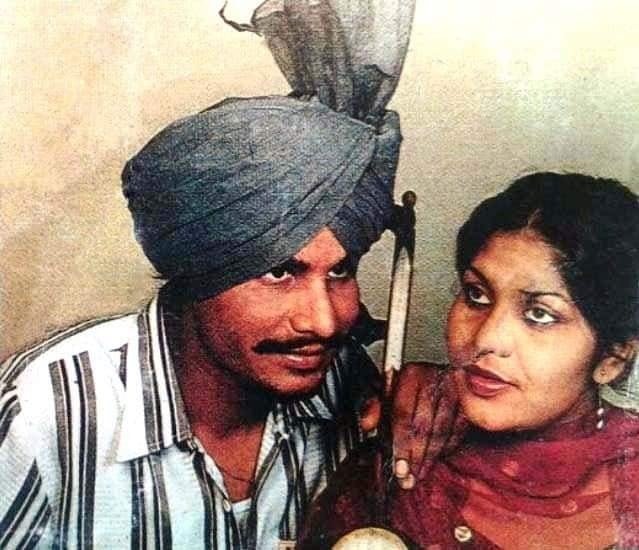Amar Singh Chamkila, even years after his demise, continues to be a mysterious figure who played a significant role in shaping the Punjabi music scene and leaving a lasting impact on subsequent generations. Prior to the unveiling of Diljit Dosanjh’s movie centered around Amar Singh Chamkila, let us delve into the intricacies of his life and the enduring legacy he left behind.
Chamkila’s legacy in Punjabi music history is undeniable. Despite the controversial nature of his lyrics, his impact on the industry is profound. Diljit Dosanjh’s song ‘Born to Shine’ pays homage to Chamkila’s remarkable journey from a humble Dalit laborer to a renowned singer. Dosanjh, a prominent figure in Punjabi entertainment, will portray Chamkila in Imtiaz Ali’s film ‘Amar Singh Chamkila’. This movie aims to illuminate the mysterious life of the singer, who tragically passed away at a young age. Alongside Dosanjh, Parineeti Chopra stars in the film, set to premiere on Netflix on April 12. As we anticipate the release, let us delve deeper into the enduring impact of Chamkila, a cultural icon who revolutionized Punjabi music and left a lasting legacy for future generations.
THE EARLY LIFE OF AMAR SINGH CHAMKILA

Chamkila, born on July 21, 1960, into the impoverished Dalit Ramdasia family of Dugri village near Ludhiana, was originally named Dhani Ram. Despite working as a labourer in textile factories in Ludhiana, his true passion lay in music. This passion led him to join drama groups where he refined his singing abilities and learned to play the harmonium and the tumbu. At the age of 18, Dhani sought out Surinder Shinda, a renowned folk singer from Punjab, who was impressed by his natural talent and took him under his wing. In no time, he made a name for himself in Shinda’s troupe as a gifted songwriter, collaborating with esteemed artists like Mohammad Sadiq and Kuldeep Manak.
CHAMKILA RECORDS FIRST ALBUM IN GLITTERY START
In 1979, Dhani made the decision to pursue a solo career and collaborated with folk singer Surinder Sonia to record his first solo album. The album, titled ‘Takue Te Takua’, consisted of eight songs and was released in the same year. This release instantly propelled Dhani and Sonia to stardom in Punjab.
The success of this album led Dhani to adopt the stage name Amar Singh Chamkila, marking a significant turning point in his career. The name Chamkila translates to “glittery” in English, reflecting his newfound fame and popularity.
Following their initial success, Chamkila and Sonia went on to release another album called ‘Baapu Saada Gum Ho Gaya’. This further increased their demand for stage shows and performances at wedding ceremonies. However, their partnership eventually dissolved due to differences in their earnings, as Chamkila sought equal pay.

After parting ways with Sonia, Chamkila briefly collaborated with singer Usha Kiran before finding a successful partnership with Amarjot Kaur, who later became his wife.
Their debut LP record, ‘Bhul Gayi Main Ghund Kadna’, featured the hit song ‘Pahile Lalkare Naal Main Darr Gayi’, which propelled them to superstardom. Following this, Chamkila and Amarjot released three devotional LPs after 1985, namely ‘Baba Tera Nankana’, ‘Talwar Main Kalgidhar Di Haan’, and ‘Naam Jap Le’. Their performances were known for their almost “Brechtian style”, characterized by a unique and engaging stage presence.
Filmmaker Kabir Singh Chowdhry, who created a film about Chamkila titled ‘Mehsampur’, once mentioned in an interview, “They had a strong connection on stage – it was as if they were engaged in a conversation, with each responding to the other’s words.”
CHAMKILA: THE WORKING-CLASS HERO
Kumool Abbi, a sociologist and professor at Panjab University, highlights how Chamkila’s music delved into new themes and subjects related to everyday village life and values, showcasing the changes brought about by the Green Revolution in Punjab and its interaction with modernity. Chamkila’s music acted as a reflection of the evolving society in Punjab, according to Abbi.

Sawarn Sivia, Chamkila’s close friend and lyricist, mentioned in an interview with The Indian Express that Chamkila preferred recording his songs during the monsoon season. Sivia also shared that Chamkila’s popularity was so immense that people would only request performances by him, overshadowing other singers of his time. Chamkila’s impact on the music scene was profound, with his emotional and raw music resonating deeply with the audience.
‘EVEN SRIDEVI WAS A HUGE CHAMKILA FAN’
According to Sawarn Sivia, Chamkila was highly adored by the people of Punjab. While most people recognize him solely as a singer, only a select few are aware of his exceptional character. In 1986, during one of his visits to my home, he noticed that my mother was unwell. Without hesitation, he generously handed me Rs 10,000, which was a substantial amount at that time.
Sawarn further revealed that even the late Bollywood icon, Sridevi, held a deep admiration for Chamkila and expressed her desire to share the screen with him.
“Sridevi was an ardent fan of Amar Singh Chamkila. She approached him to be her leading man in a film. However, he declined, stating that he couldn’t speak Hindi. Sridevi offered to provide him with language training within a month, but he declined, fearing a loss of Rs 10 lakh during that period. Although Sridevi agreed to collaborate on a Punjabi film, unfortunately, it never materialized,” Sawarn disclosed during the YouTube interview.
CHAMKILA FACED HATRED FOR MARRYING JAT CO-SINGER

Chamkila, however, stirred controversy with the content of his songs, which addressed issues such as alcoholism, drug abuse, hypermasculinity, and extramarital affairs.
According to sociologist Kumool Abbi, Chamkila became a symbol of vices for the militants, who took it upon themselves to cleanse society of all its evils.
“People found it challenging to confront their suppressed and repressed desires when they heard Chamkila’s songs. Consequently, they labeled his music as unacceptable, intolerable, and obscene,” explains Kumool Abbi in an interview with IndiaToday.In.
On a personal level, Chamkila faced resentment and animosity due to his second marriage to his singing partner, Amarjot. A portion of Punjab’s society struggled to accept the union between a Dalit singer and a Jat woman.
The couple had a son together.
CHAMKILA’S MURDER STILL REMAINS A MYSTERY
On the 8th of May, 1988, Chamkila and Amarjot were scheduled to perform in Mehsampur, Jalandhar. Tragically, as soon as they stepped out of their iconic white ambassador car, they were mercilessly shot by three masked individuals. Shockingly, two of their band members also lost their lives on the spot.
To this day, no arrests have been made in connection with this incident. However, numerous conspiracy theories surround the deaths of Chamkila and Amarjot.
Some speculate that Chamkila was targeted by Khalistani terrorists due to their desire to cleanse society and their ongoing feud with him. Others suggest that rival musicians may have orchestrated a hit on him.
Additionally, there are those who believe that Amarjot’s murder was an honor killing, as her family disapproved of her marriage to a Dalit man, leading to tragic consequences.
Just as Chamkila’s rise to fame was meteoric, his sudden demise only added to the mystique surrounding him.
Chamkila’s influence extends to individuals like Diljit Dosanjh, who is among the millions inspired by the legendary singer. In fact, Dosanjh has portrayed Chamkila in two films, with “Amar Singh Chamkila” being directed by Imtiaz Ali. Prior to this, he starred in a film titled “Jodi.”
The fact that a Bollywood film has been made to commemorate the 35th anniversary of Chamkila’s death is a testament to the remarkable achievements of this Punjabi singer during his relatively short but impactful decade-long career.
Amar Singh Chamkila’s enduring impact on Punjabi music remains as powerful today as it was many years ago. His unwavering dedication to his craft continues to strike a chord with audiences across the globe. As Imtiaz Ali’s film gets ready to reveal the untold story of this legendary folk artist, one thing is clear – Chamkila’s legacy is everlasting, destined to withstand the test of time for future generations.

